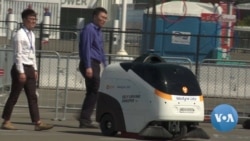They are known as “Little White Snails,” self-driving street sweepers that for several years cleaned up parks and other public places across China. Kids liked them.
Now the 4-foot-high sweepers are keeping humans safe.
After the outbreak in China, over 200 Little White Snails were enlisted to fight the spread of the virus. They have been deployed to hospitals in China to clean and disinfect, said Mike Jellen, chief commercial officer, at Velodyne Lidar, the U.S. company that works with Idriverplus, the maker of the sweepers.
“They’re spraying vast amounts of disinfectant,” said Jellen.
An army of snails
Before the coronavirus outbreak, Idriverplus was working to get autonomous vehicles into Chinese daily life. They saw the pint-sized sweepers and their delivery robots as an inroad to gaining acceptance in the society, said Shuhao Huo, a vice president at Idriverplus, at an event in California last year.
“Because autonomous driving technology is a new technology, in this size, maybe people can accept it easier,” he said.
The machines navigate using a combination of pre-programmed maps and real-time sensing including Lidar, which sends and receives light pulses to create a 3-D scan of the ever-changing surroundings.
Protecting health care workers
Idriverplus robots also deliver meals and medical supplies, reducing human interaction and the risk of exposure.
Throughout the world, robots, easily disinfected and virus-free, are being prepared to take on some of the tasks of health care workers. Idriverplus is helping to develop a mobile robotic arm that can take throat cultures and check respiration.
As the world fights the pandemic, the quest to save lives is increasingly bringing robots and humans in closer contact.






